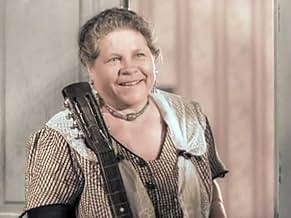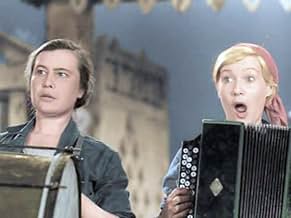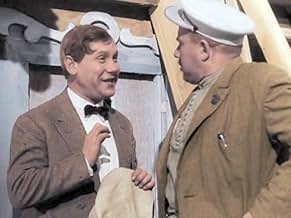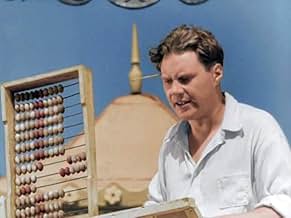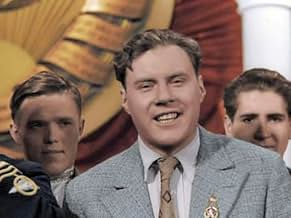IMDb RATING
6.6/10
821
YOUR RATING
Widely claimed to be Joseph Stalin's favorite movie, this classic musical comedy is a must-see. The action takes place on a steamboat on the iconic Volga River, as two groups of performers t... Read allWidely claimed to be Joseph Stalin's favorite movie, this classic musical comedy is a must-see. The action takes place on a steamboat on the iconic Volga River, as two groups of performers travel to Moscow to perform in the Moscow Musical Olympiad.Widely claimed to be Joseph Stalin's favorite movie, this classic musical comedy is a must-see. The action takes place on a steamboat on the iconic Volga River, as two groups of performers travel to Moscow to perform in the Moscow Musical Olympiad.
- Awards
- 1 win total
Anatoli Shalayev
- The Boy Musical Prodigy
- (as Tolya Shalayev)
Mariya Mironova
- The Secretary
- (as M. V. Mironova)
Nikita Kondratyev
- The Waiter
- (as N. S. Kondratyev)
Vsevolod Sanaev
- The Lumberjack
- (as V. V. Sanayev)
Alexei Dolinin
- The Militia Man
- (as A. G. Dolinin)
Ivan Chuvelyov
- The Olympiad Representative
- (as I. P. Chuvelyov)
Nikolai Khryashchikov
- Appearing
- (uncredited)
Yakov Rykov
- Tugboat captain
- (uncredited)
Lidiya Vinogradova
- Amateur Performer
- (uncredited)
Featured reviews
Selfish uncommitted bureaucrat Ivan Ivanovich Byvalov (who looks like Mario Bros!) is the most interesting element in this very light-hearted slaptstick musical comedy by Grigori Aleksandrov, who also directed 11 years before October: Ten Days that Shocked the World. Volga-Volga has some curious background stories, such as the title coming from a jokingly suggestion by Charlie Chaplin when he and Aleksandrov were rowing together in the United States and the British filmmaker heard those words in the lyrics of a folk song sang by the Soviet. Another very curious story is that Volga-Volga is claimed to be the favorite movie by Joseph Stalin, what is particularly surprising, as there are many funny gags about things that did not work in URSS! The raft soon got bogged down, all local boats were broken and still being repaired, the mare for transportation lacked horshoes, the balalaikas crafted in the factory had the worst sound quality ever heard, and the telephone calls were absolutely unintelligible (additionally, the trip over the river eventually happens in a steamboat which is said that was gifted 30 years before by the United States, and all its only problem were originated by bad maintanance!). Besides all that, Byvalov was the archetypical ambitious bureaucrat who had no concern about the quality of the works he supervised, and his only interest was to reach the most important office, and closest to Moscow, possible. It is mentioned in the beginning of the film that Byvalov moved to another institution to work, getting closer and closer to Moscow, 20 times just in the last five years! He was only two weeks managing the balalaika craft factory but was already waiting for a call to a new job! Did Stalin identify himself with the character or was his vanity what made him like that his name was given to the steamboat of the trip from the Great Volga habour to Moscow?! As a matter of fact, the silly song in the very last minute of the movie says bureaucrats like Byvalov were rare an represented "the old years", in a laughable attempt to score some brownie points from the regime... Besides Byvalov's background and the mockery on production dysfunctionalities, another interesting element in the beginning of the movie is the brief change from romantic idealization to fierce anger between the couple who had opposite views on music: the man loved classic music and rhe woman liked folk one. That romantic comedy element endures throughout the film, until the predictable happy end. Before the steamboat trip, there is an eight-minute collective artistic presentation of the whole village to a frightened Byvalov that is awesome, very amusing and well done, perhaps onde of the nicest moments of the film, second only to the initial appearance of characters Byvalov and his sycophant assistant Zoya Ivanovna. Eventually, the story continues with a troublesome trip, musical team duels, a lot of rough-and-tumble, and misunderstandings. Overall, the film has ups and downs, some tepid moments and silly overacting, but also quite funny cartoonish musical slapstick and smart gags on Soviet life and society. While not a masterpiece from Soviet cinema, it is underrated and worth watching.
Even those of us with some sort of education in the field of cinema rarely get to see other Soviet films than those of Eisenstein, Tarkovskij and maybe Pudovkin. It´s easy for every western film fan to become as prejudiced as the bureaucrat Byvalov in Volga-Volga: "Talent? in this dump?" My point being, of course, that it would be unfair to world cinema as well as to oneself if one were to deny oneself the pleasures of at least once in a while seeing a Feuillade serial, a German mountain film or a Soviet musical. Volga-Volga is an excellent choice for the curious cinephile. As everyone points out, it has the distinction of reportedly being Stalin´s favourite film, it has stars in it is well as great music, I could go on and on. The main reason for seeing Volga-Volga is of course that it´s great fun. It had me in stitches more than once.
A comment on polart´s vhs edition of Volga-Volga: Granted, the subtitles are yellow and eminently readable, but they are also quite often badly timed and frequently seem insufficient. Also, the framing seems to be slightly off, something i´m hesitant in blaming comrades Alexandrov and Petrov for.
A comment on polart´s vhs edition of Volga-Volga: Granted, the subtitles are yellow and eminently readable, but they are also quite often badly timed and frequently seem insufficient. Also, the framing seems to be slightly off, something i´m hesitant in blaming comrades Alexandrov and Petrov for.
A musical comedy. The famous work of the famous director Grigory Alexandrov and the actress Lyubov Orlova, beloved by millions at that time, as well as Comrade Stalin's favorite film, which he often reviewed. And how could you pass by such a thing? So the author of this review could not do this, and looked at the picture with great pleasure. And the final result rather pleased him. And here is a brief opinion - A good Soviet musical comedy of the late thirties. There were almost only advantages in it (with the exception of editing, but the author of this review will tell you about this in a separate paragraph), but for now you should finish the introduction and move on to the interesting.
So, here are the pros: 1. The scenario - the picture tells the story of two amateur musical groups that go to Moscow to participate in the Olympics, and the leaders of these groups: Avdotya Petrova, nicknamed "Strelka" and Alexey Trubyshkin are lovers, which gives everything that is happening a whisper of piquancy. At the same time, the local bureaucrat Byvalov takes part in all this activity, who wants to "push himself" at the expense of talented people. The old pilot fits well into this company. There are many different situations waiting for them on the way, and in the final there will be a grand triumph. In addition, the creators even destroy the "fourth wall", which looks pretty good. In addition to the fact that the script here is easy, it also charges every viewer who looks at the picture with a great mood. It's worth a lot.
2. Humor - there are frankly funny moments, and a lot of funny situations, and outright antics of some actors (in most cases it works correctly). Of course, wild laughter is not worth hoping for, although there is one point that strongly leads to this. The humor here is more mundane, and that's what catches on.
3. Songs and music - this picture can now be called a musical with full rights, since they sing and dance quite often here - and it turned out just great. The precision of the movements, and this despite the fact that some of the artists were already far from young. And the songs are pleasing to the eye and ear. Although there is not a single one that sticks in the memory (except classical music, which everyone knows). Although their text was written by Vasily Lebedev-Kumach.
4. The life of the USSR in the thirties - we will be shown the Volga-Don Canal, which was one of the great buildings of communism, musical competitions, and not only. They will show us how life itself is changing, how the achievements of the Soviet government made the dreams of ordinary people a reality. And although the scenario line with Byvalov is reduced to humor, it reflects reality (which is still relevant).
Now it should be said about an important point that somewhat spoils the overall impression, namely the crooked installation, and the author of this review watched the color version of the painting, which was castrated in the fifties of the last century, and the original of 1938 has not been preserved (thank you tell the Cornhusker for this), so we cannot enjoy the original version. And it's lucky that they didn't paint the fully castrated version, because there is a black-and-white version from 1961, from where all mentions of Stalin, his images and busts were cut out. The installation was done very poorly and the glues are visible (this is written by a person who has been engaged in installation for a long time).
Separately, the author of this review wants to thank the artists Igor Ilyisky (bureaucrat Byvalov), Lyubov Orlova, Andrei Tutyshkin, Vladimir Volodin (old pilot), and all the others for the talented performance of their roles in this musical comedy. Now their acting will seem too "pompous" to many, but they tried anyway, and it's not for nothing that the picture has gained well-deserved popularity, and it's not for nothing that it has gained cult status in the country. You need to know the classics!
A score of 8 out of 10 and a recommendation to watch!
So, here are the pros: 1. The scenario - the picture tells the story of two amateur musical groups that go to Moscow to participate in the Olympics, and the leaders of these groups: Avdotya Petrova, nicknamed "Strelka" and Alexey Trubyshkin are lovers, which gives everything that is happening a whisper of piquancy. At the same time, the local bureaucrat Byvalov takes part in all this activity, who wants to "push himself" at the expense of talented people. The old pilot fits well into this company. There are many different situations waiting for them on the way, and in the final there will be a grand triumph. In addition, the creators even destroy the "fourth wall", which looks pretty good. In addition to the fact that the script here is easy, it also charges every viewer who looks at the picture with a great mood. It's worth a lot.
2. Humor - there are frankly funny moments, and a lot of funny situations, and outright antics of some actors (in most cases it works correctly). Of course, wild laughter is not worth hoping for, although there is one point that strongly leads to this. The humor here is more mundane, and that's what catches on.
3. Songs and music - this picture can now be called a musical with full rights, since they sing and dance quite often here - and it turned out just great. The precision of the movements, and this despite the fact that some of the artists were already far from young. And the songs are pleasing to the eye and ear. Although there is not a single one that sticks in the memory (except classical music, which everyone knows). Although their text was written by Vasily Lebedev-Kumach.
4. The life of the USSR in the thirties - we will be shown the Volga-Don Canal, which was one of the great buildings of communism, musical competitions, and not only. They will show us how life itself is changing, how the achievements of the Soviet government made the dreams of ordinary people a reality. And although the scenario line with Byvalov is reduced to humor, it reflects reality (which is still relevant).
Now it should be said about an important point that somewhat spoils the overall impression, namely the crooked installation, and the author of this review watched the color version of the painting, which was castrated in the fifties of the last century, and the original of 1938 has not been preserved (thank you tell the Cornhusker for this), so we cannot enjoy the original version. And it's lucky that they didn't paint the fully castrated version, because there is a black-and-white version from 1961, from where all mentions of Stalin, his images and busts were cut out. The installation was done very poorly and the glues are visible (this is written by a person who has been engaged in installation for a long time).
Separately, the author of this review wants to thank the artists Igor Ilyisky (bureaucrat Byvalov), Lyubov Orlova, Andrei Tutyshkin, Vladimir Volodin (old pilot), and all the others for the talented performance of their roles in this musical comedy. Now their acting will seem too "pompous" to many, but they tried anyway, and it's not for nothing that the picture has gained well-deserved popularity, and it's not for nothing that it has gained cult status in the country. You need to know the classics!
A score of 8 out of 10 and a recommendation to watch!
Allegedly, this was Joseph Stalin's favourite film, and it may be interesting to see for oneself what amused one of the sickest minds in history. Apart from that historical aspect, this film has no basis in reality, moreover, it never did. While millions of Russian citizens were being sent to concentration camps for no reason except suspicion of treason (whatever that meant), this film depicts life in the Imaginary Soviet Union, where people live happy and carefree lives. A good example of how Soviet propaganda worked itself out in the Russian cinema. Aesthetically, there are many good Russian -- even Soviet -- films. However,this one isn't one of them.
When Stalin ordered Alexandrov to make this movie, he said he only wanted to see the happy images of the simple rural people along the river Volga. One could say, Stalin wanted something that would prove to him his people are happy (even if he ordered others to lie to him to make the appearance of happiness). There's no real story or plot, there's just a number of folk dances and rituals thrown together in order to entertain. It's kitch that served only one purpose - to make a dictator happy. I wouldn't even classify this movie as a comedy, it's simply a musical, or better yet a recorded account of folk dancing and singing with some attempts to moderate the time in between the musical sequences. Thus you should not even look for the depth of the characters or the story. Were it made that way Alexandrov might have even been shot! This film could not afford to be critical. IT was made in an era of Soviet history when one could not express one's self as an artist, but had to do what the propaganda machine demanded of him.
Did you know
- TriviaFamously, this was Joseph Stalin's favorite film and he would often show off how well he knew it by performing every part just before the actors on screen.
- ConnectionsFeatured in Komediya davno minuvshikh dney (1980)
Details
- Runtime1 hour 44 minutes
- Color
- Sound mix
- Aspect ratio
- 1.37 : 1
Contribute to this page
Suggest an edit or add missing content



